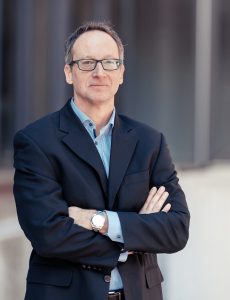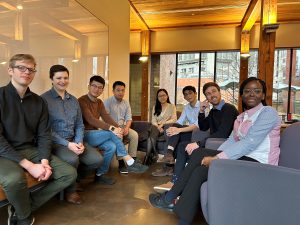
Publications, presentations, and public explanations. These three faculty activities influence and expand the teaching topics both graduate and undergraduate students encounter during their time at the University of Toronto. Members of the Department of Economics are always in demand and 2023 was no exception. While this review of 2023 is certainly not extensive, taken together the activities captured for each month reflect the diversity of Economics as it is practiced today, and the variety of interests individual faculty members choose to explore.
How can firms estimate consumer demand? Investigating this question with elaborations got the Department of Economics’ 2023 off to a strong start with the January release of Econometrics Journal 26 that contains Professor Victor Aguirregabiria’s paper “Dynamic demand for differentiated products with fixed-effects unobserved heterogeneity.”
Can Geography Explain Agricultural Productivity Differences Across Countries? In February Professor Diego Restuccia and his co-author Tasso Adamopoulos addressed the question in a VoxDev column outlining why “low agricultural productivity in developing countries is not destiny.”
Not everyone’s purchasing decisions are affected by inflation in the same way. What proportion of consumers are made better or worse off by price changes? In their paper in the The Review of Economic Studies, released in March 2023, Professor Rahul Deb and his co-authors present a model that can be directly taken to household expenditure data. Using the model, Professor Deb and his coauthors developed a novel econometric theory to answer the question.
Have public sector salary disclosure laws had an impact on university faculty salaries in Canada? Professors Kory Kroft, Michael Baker, and their co-authors examined the question in the April edition of the American Economic Journal: Applied Economics. The authors have found evidence that the disclosure laws reduced the gender pay gap by approximately 20–40 percent.

Who marries whom, and why? The question is at the heart of Professor Emeritus Aloysius Siow’s career. The specialist in Economics of the Family officially retired in May and the All in the Family conference marked the occasion with luminaries in the discipline from Chile, the USA, and France coming to celebrate.
May also saw the release of The Quarterly Journal of Economics, Volume 138. In that edition, Professor Gueorgui Kambourov and his co-authors asked: How does wealth taxation differ from capital income taxation? “When the return on investment is equal across individuals, a well-known result is that the two tax systems are equivalent,” the authors assert.
How do workers adjust to robots? The latest version of Professor Tianyi Wang and his co-authors’ working paper on the topic was released in June. The authors find that more exposed workers increased their participation in technical training and were significantly more likely to retire early.
In July Professor Cleméntine Van Effenterre spoke with UTM Professor Pamela Medina Quispe on Van Effenterre’s podcast Inequalitalks. Medina-Quispe’s research investigated questions about how trade liberalization in Peru affected women’s participation in the labour force, as well as their marriage and fertility decisions.
How is the information provided via platform-generated reviews different from that communicated through user-generated reviews? While CGRs are subjective, PGRs rely on platform-generated date that includes product quality measures, customer service, and logistics. In August, Professor Yanyou Chen presented this work in progress he is preparing with co-authors at the SUFE-Jinan IO Conference 2023.
Tutoring might improve graduation rates among at-risk students, but can it be more cost-effective? In September Professor Philip Oreopoulos the Conversations on Economic Inclusion series to discuss how tutoring and mentoring programs can bridge educational gaps and boost academic achievement.
What are the evidence-based solutions to the world’s pressing social and economic concerns? The Forward Society (FOS) Lab website went live in October to showcase how FOS research affiliates and their practice partners are working together to uncover evidence and inform policies to improve lives.
How did Canadian workers adjust so well to US Trade? Professor Peter Morrow talked about the inquiries he and Brian Kovak are making on the Trade Talks pod cast in November. It’s been almost 40 years since trade liberalization with the US and almost 30 years since NAFTA was implemented. According to Morrow, Canadian workers did rather well when faced with this massive new source of competition.

What does the future of Economics research look like? Asked in November, the question was answered in December by the department’s PhD candidates on the job market for 2023-2024.
There were other ways faculty contributed to the discipline this year too. Michelle Alexopoulos is

current president of the Canadian Economics Association, Gabriel Carroll was appointed a fellow of the Econometric Society, Daniel Trefler is now a member of the Royal Society, Diego Restuccia’s Canada Research Chair was renewed and Gustavo J. Bobonis was named an Evidence Champion. And, long before the year’s finish line, Nazanin Khazra coached the department’s runners to raise over $2500 for breast cancer research.
The soft darkness of mid-December demands time to reflect on the year that was. The tradition is especially important to respect in a department culture built on complex ideas and the pressures of evidence generation. May it help everyone prepare for the academic adventures of 2024!
